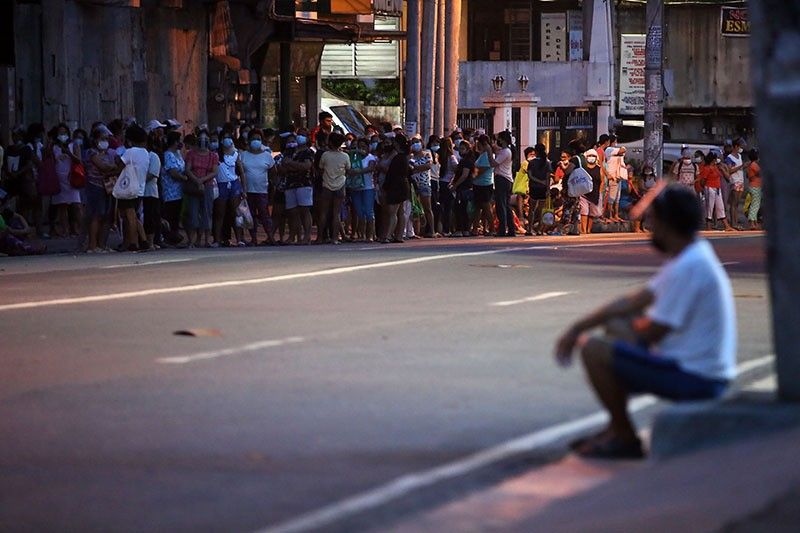NTF-ELCAC admits to 'monitoring' community pantries but not profiling

MANILA, Philippines — From their slogans to their poses, practically every facet of the community pantries in the country was hit by the government's anti-insurgency task force Wednesday as it tripped over its arguments for and against the communal supply tables.
Community pantries have sprouted all over the country in the past months but have also reported harassment and profiling by cops, though police leadership continues to deny but also defend these instances.
At the meeting of the House Committee on Human Rights on the emergence of community pantries, Lt. Gen. Antonio Parlade, among the spokespersons of the National Task Force to End Local Communist Armed Conflict, held issue with the "from each according to his ability, to each according to his needs" slogan of the community pantries.
"Sounds familiar, right? Similar to the slogans you see in the community pantries sprouting all over the country, but no, it's a quote from Karl Marx in his 1875 Critique of the Gotha Program," his presentation read.
Reading or quoting Karl Marx is not in anyway prohibited under the country's laws.
He also presented messages sent to the NTF-ELCAC's legal cooperation cluster in arguing that the task force "should be careful" in its approach to the pantries.

"What's dubious with the [community pantry] is the acronym they chose. That's inviting and baiting us to red-tag them so we should be careful...I agree it's time [for the] DILG, PNP and AFP to monitor them but with extreme caution," the messages read.
"We can also send our own people, ask for goods, listen to what they tell people, document their propaganda if there is. When we have enough then we take action."
It is also not in any way true that the "Community Pantry of the Philippines-National Pantry Association" or CPP-NPA acronym was an official name for the movement.
Task force slams community pantries for 'demeaning government'
The government's anti-communist task force at the hearing also defended its treatment of community pantry organizers, saying their initiatives made the government and the country look bad.
"The reason they're doing this is because they're telling people that our government is palpak and is incapable of addressing our people's needs in the time of the pandemic, and questions this government's moral ascendancy to remain in authority," Undersecretary Severo Catura, NTF-ELCAC spokesperson, said.
He argued that the name "community pantry" was new, but the concept was not, as it was earlier "done without fanfare, in an orderly fashion, without media hype, [and] without any hint at demeaning government for alleged failure in governance."
Parlade in his presentation listed what he said were "anti-government and propaganda materials" which called for:
- Mass testing and contact tracing
- An end to the government's militaristic lockdown
- P10,000 monthly aid for the poor
- P100 daily wage hike subsidy
It is unclear how calls for mass testing amid a pandemic can be perceived as anti-government. President Rodrigo Duterte himself once mistook a call from doctors' groups for a return to enhanced community quarantine as a call for revolution.
RELATED: Doctors sorry if Duterte took their suggestions as 'call for a revolt'
Catura even went as far as questioning photos of pantry organizer Ana Patricia Non raising her fist in the air, which he said politicized the initiative.
Parlade also cried "fake news" once more, slamming news outfits Rappler and The Philippine Daily Inquirer for doing their jobs when they reported that Parlade admitted to profiling pantry organizers.
"They made it bigger and really sensationalized the issue. They kept on using terms like 'profiling' and 'red-tagging'," he said.
The lieutenant general did, in fact, admit to doing so. On April 20, he was quoted as saying, "we’re just checking ‘yung background ng mga ‘to."
Police, task force deny red-tagging anew
Asked if the PNP would be investigating reports of profiling at the hands of cops, Police Brig. Gen. Vincent Calanogan, acting chief of the PNP Human Rights Affairs Office dodged the question and said that there was nothing wrong with cops asking for information.
"If we hurt anyone, it's only right to apologize, but we do not think that there was any profiling that happened. The questioning of our patrol officers is part of their job so they understand the situation in their locality. That's their mandate," he said.
Calanogan added in his presentation that the PNP has recorded "46 structures of the same concept" around the country.
As it currently stands, a number of community pantries have already had to close their doors after encounters with cops who asked for personal information.
- One pantry organizer in Marikina was asked for his contact information and personal address. Police also asked him if he was a member of any organization and offered him a ride home afterwards.
- Two organizers in a town in the Bangsamoro Autonomous Region in Muslim Mindanao were made to fill up an internal memo handed to them by local police.
- Another pantry in Pandacan, Manila opted to close its doors out of fear for the safety of its volunteers after cops asked them to fill up a data sheet.
DSWD Undersecretary Luzviminda Ilagan also said that organizers who have experienced trauma after being profiled by cops can approach the department for support.
Parlade and the task force have made the distinction that "checking" and "profiling" are two different things before.
However, the National Privacy Commission has said that doing so the wrong way could be weaponized to "instill bias against a person."
"Should there be a need to collect personal data to maintain peace and order, they must accomplish the same with transparency, legitimate purpose, and proportionality and that citizens’ rights are fully observed," it said.
- Latest
- Trending






























